Drug addiction refers to a chronic condition characterized by compulsive drug seeking, use, and dependence despite harmful consequences.
It is a condition that affects an individual's physical and mental health as well as their personal and professional life.
Drug addiction is a sensitive issue that can affect individuals in various ways, including their rights as employees. Today, we are exploring the topic of drug addiction employee rights.
In Canada, employees have certain rights protected by law, even if they are struggling with drug addiction. These rights are designed to ensure fair treatment and support for employees facing challenges related to addiction.
Under Canadian law, employees have the right to privacy and confidentiality regarding their medical information, including addiction issues.
Employers are prohibited from discriminating against employees based on their addiction status. They must provide reasonable accommodations to support employees in recovery.
Employers are encouraged to create a supportive work environment that promotes understanding, compassion, and access to resources for employees struggling with addiction.
Understanding these rights is essential for both employees and employers to deal with the complexities of drug addiction in the workplace while upholding fairness, dignity, and respect for all individuals involved.
Throughout this blog, we will explore these rights in more detail and guide you on protecting and upholding them in the workplace.
Canadian Laws and Regulations Regarding Drug Addiction in the Workplace
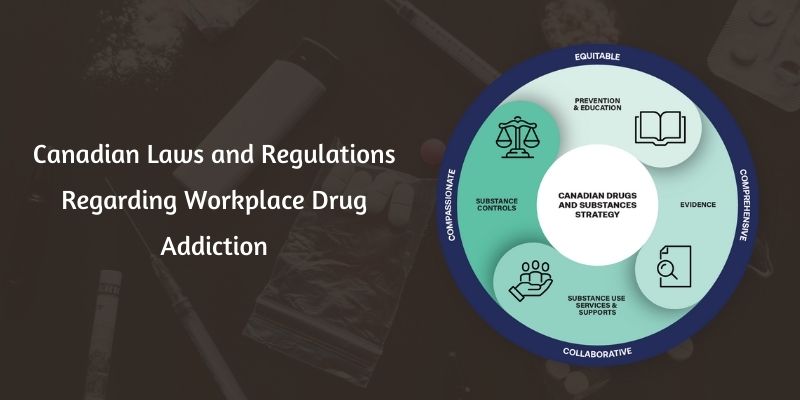
Understanding the legal framework surrounding drug addiction in the workplace is crucial for both employers and employees. Here's an overview of critical Canadian laws and regulations:
Human Rights Legislation
Canada's human rights legislation prohibits discrimination based on disability, which includes drug addiction. Employees with drug addiction are protected from discriminatory treatment in all aspects of employment, including hiring, promotion, and termination.
Employers must provide reasonable accommodations to support employees in recovery, such as modified work duties or flexible schedules.
Occupational Health and Safety Regulations
Occupational health and safety regulations mandate that employers provide a safe work environment for all employees. This includes addressing hazards related to drug addiction, such as impairment in the workplace.
Employers are required to implement policies and procedures to prevent and address substance abuse, including drug testing where necessary, and to provide education and training on the risks of drug addiction in the workplace.
Privacy Laws
Privacy laws in Canada protect employees' medical information, including information related to drug addiction.
Employers are prohibited from disclosing an employee's addiction status without their consent, except in specific circumstances outlined by law.
Employers must maintain confidentiality and ensure that any information collected or shared regarding an employee's addiction is done so in compliance with privacy laws.
Understanding these laws and regulations is essential for employers to create a supportive and legally compliant workplace environment for employees with drug addiction.
By adhering to these legal requirements, employers can protect the rights and well-being of all employees while promoting a safe and inclusive workplace culture.
Rights of Employees with Drug Addiction in the Workplace
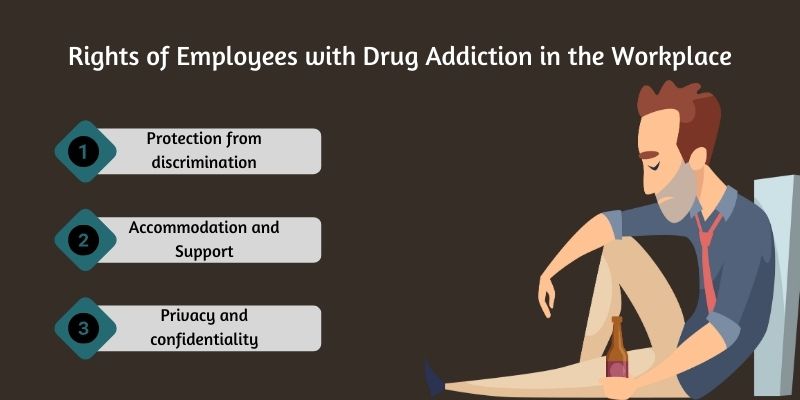
Employees with drug addiction have specific rights protected by law to ensure fair treatment and support in the workplace.
Understanding these rights is essential for employees and employers to promote a supportive and inclusive work environment.
Protection from Discrimination
Employees with drug addiction are protected from discrimination under human rights legislation. Employers cannot discriminate against employees based on their addiction status in any aspect of employment, including hiring, promotion, or termination.
It is illegal for employers to make decisions about employment opportunities or treatment based on an employee's addiction status.
Accommodation and Support
Employers have a legal obligation to provide reasonable accommodations to employees with drug addiction to support their recovery and enable them to perform their job duties.
This may include modifications to work schedules, duties, or the provision of additional support services such as access to counseling or treatment programs.
Employers should work collaboratively with employees to identify and implement appropriate accommodations based on individual needs.
Privacy and Confidentiality
Employees with drug addiction have the right to privacy and confidentiality regarding their medical information, including their addiction status. Employers are legally required to maintain confidentiality and protect employees' privacy rights.
Information about an employee's addiction status should only be shared with individuals who have a legitimate need to know, and employers must take appropriate measures to safeguard this information from unauthorized disclosure.
By respecting and upholding the rights of employees with drug addiction, employers can create a supportive and inclusive workplace environment where all employees feel valued, respected, and empowered to succeed.
Employers must know these rights and obligations and proactively ensure compliance with relevant laws and regulations.
Responsibilities of Employers
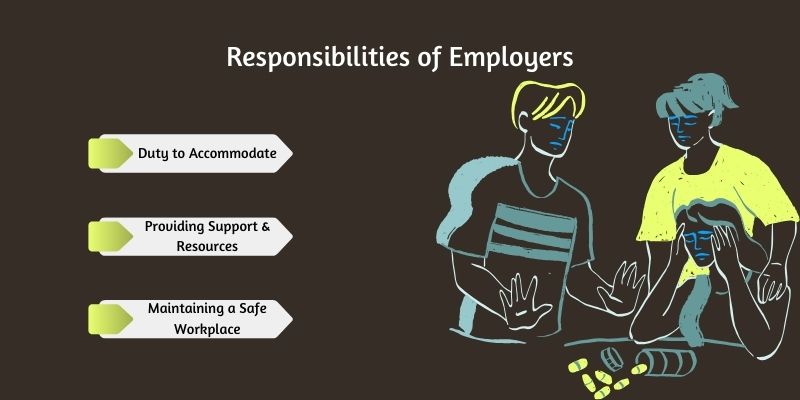
Employers have specific responsibilities when it comes to supporting employees with drug addiction in the workplace.
Understanding and fulfilling these responsibilities are essential for creating a supportive and inclusive work environment.
Duty to Accommodate
Employers have a legal obligation to accommodate employees with drug addiction to the point of undue hardship.
This means making reasonable adjustments to the work environment or job duties to enable employees to perform their duties effectively while managing their addiction.
Accommodations may include flexible work hours, modified job duties, or access to support services such as counseling or treatment programs.
Providing Support and Resources
Employers are responsible for providing employees with access to support and resources to help them manage their addiction and maintain their well-being.
This may include offering employee assistance programs (EAPs), counseling services, or referrals to community resources for addiction treatment.
Employers should also ensure that supervisors and managers are trained to recognize signs of addiction and appropriately support needy employees.
Maintaining a Safe Workplace
Employers must maintain a safe workplace for all employees, including those with drug addiction. This includes implementing policies and procedures to address safety hazards related to addiction, such as impairment on the job.
Employers may need to implement drug testing programs, provide education and training on substance abuse prevention, and establish protocols for addressing drug-related incidents in the workplace.
By fulfilling these responsibilities, employers can create a supportive and safe work environment that promotes the well-being and success of employees with drug addiction.
Employers need to prioritize compliance with legal obligations and take proactive steps to support employees in managing their addiction while maintaining their dignity and rights in the workplace.
Legal Framework for Addressing Drug Addiction in the Workplace
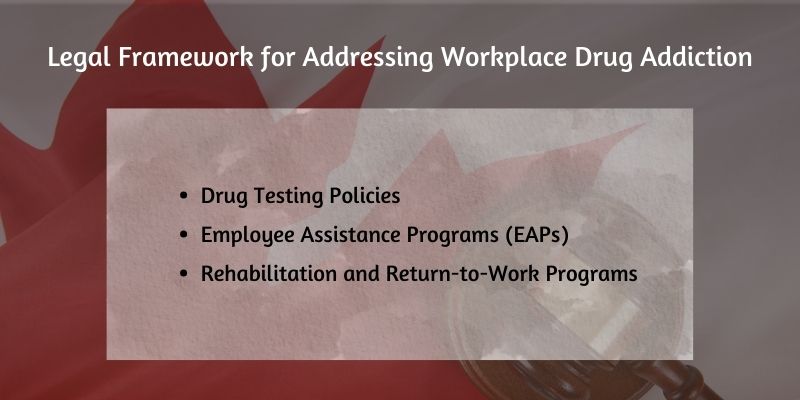
The legal framework for addressing drug addiction in the workplace includes various policies and programs aimed at supporting employees while maintaining a safe and productive work environment.
Understanding this framework is essential for employers to explore legal requirements effectively.
Drug Testing Policies
Employers may implement drug testing policies as part of their efforts to address drug addiction in the workplace.
These policies outline the circumstances under which drug testing may be conducted, the types of tests used, and the consequences of positive test results.
Drug testing policies must comply with relevant laws and regulations, including privacy laws and human rights legislation, to ensure fairness and legality.
Employee Assistance Programs (EAPs)
Employee Assistance Programs (EAPs) are employer-sponsored programs designed to support employees with personal or work-related challenges, including drug addiction.
EAPs typically offer confidential counseling, referrals to treatment programs, and resources for addressing substance abuse issues.
Employers may encourage employees to utilize EAP services and provide information about available resources to promote employee well-being and recovery.
Rehabilitation and Return-to-Work Programs
Rehabilitation and return-to-work programs are initiatives aimed at supporting employees with drug addiction in their recovery journey and facilitating their return to the workplace.
These programs may include access to rehabilitation services, accommodations to support employees during their recovery, and gradual reintroduction to work duties.
Employers play a crucial role in facilitating the successful transition of employees back to work while ensuring their safety and well-being.
By implementing appropriate drug testing policies, offering Employee Assistance Programs, and providing rehabilitation and return-to-work programs, employers can effectively address drug addiction in the workplace while promoting the health and productivity of their employees.
Employers need to remain informed about legal requirements and best practices in addressing drug addiction to create a supportive and compliant work environment.
Challenges and Controversies
Addressing drug addiction in the workplace presents various challenges and controversies that employers must explore.
Understanding and addressing these issues are essential for creating effective strategies to support employees while maintaining a safe and productive work environment.
Balancing Employee Rights and Workplace Safety
One of the primary challenges is balancing the rights of employees with drug addiction with the need to maintain workplace safety.
Employers must respect employees' rights to privacy, confidentiality, and non-discrimination while ensuring a safe work environment.
This can be particularly challenging when implementing drug testing policies or making decisions about accommodations for employees with addiction issues.
Striking the right balance requires careful consideration of legal requirements, ethical considerations, and the unique circumstances of each situation.
Stigma Surrounding Drug Addiction
Another significant challenge is the stigma surrounding drug addiction, which can impact how employees with addiction issues are perceived and treated in the workplace.
Stigma can lead to discrimination, isolation, and barriers to seeking help, making it more challenging for employees to address their addiction and access necessary support services.
Employers must work to combat stigma by promoting understanding, empathy, and support for employees struggling with addiction.
This may involve education and awareness initiatives, destigmatizing language and attitudes, and fostering a culture of acceptance and inclusivity.
By addressing these challenges and controversies head-on, employers can create a workplace environment that supports employees with drug addiction while upholding principles of fairness, safety, and respect.
By promoting awareness, understanding, and proactive intervention, employers can play a crucial role in supporting employees on their journey to recovery and creating a workplace culture that values health, well-being, and mutual support.
Recommendations for Employers and Employees
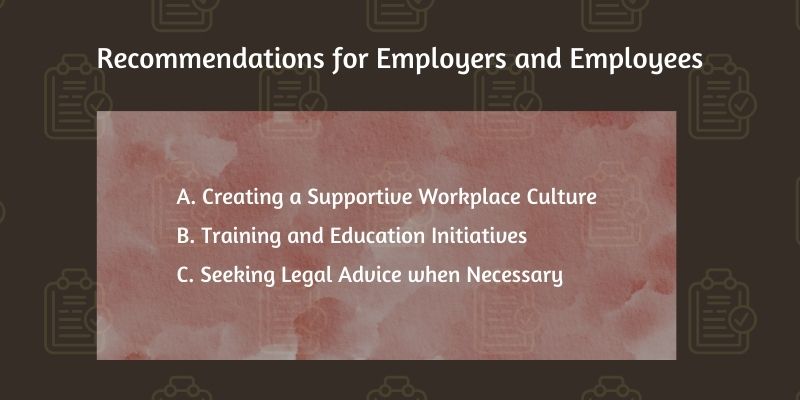
Dealing with drug addiction in the workplace requires collaboration and proactive efforts from both employers and employees.
Here are some recommendations for creating a supportive and practical approach to addressing addiction issues:
Creating a Supportive Workplace Culture
Employers should prioritize creating a workplace culture that promotes understanding, compassion, and support for employees struggling with addiction. This includes fostering open communication, reducing stigma, and providing resources and support services.
By fostering a supportive environment, employers can encourage employees to seek help and access the support they need to address their addiction.
Training and Education Initiatives
Training and education initiatives aimed at increasing awareness and understanding of drug addiction and its impact on the workplace can benefit both employers and employees.
Employers should train supervisors and managers to recognize signs of addiction, respond appropriately, and access support resources.
Employees can benefit from education on the signs and symptoms of addiction, how to support colleagues in need, and where to seek help if they are struggling with addiction themselves.
Canada Safety Training offers comprehensive Substance Abuse Awareness Training that can help employees and employers deal with addiction effectively and provide support to the affected.
Seeking Legal Advice when Necessary
When addressing drug addiction in the workplace, both employers and employees may encounter legal complexities and challenges. Both parties must seek legal advice when necessary to ensure compliance with relevant laws and regulations and protect their rights and interests.
Legal experts can guide privacy rights, accommodation requirements, and discrimination laws, helping employers and employees navigate the legal landscape effectively.
By following these recommendations, employers and employees can collaborate to create a supportive and inclusive workplace environment that effectively addresses drug addiction while upholding the rights and well-being of all individuals involved.
Collaboration, communication, and a commitment to promoting health and safety are crucial to achieving success in addressing addiction issues in the workplace.
Final Words
Addressing drug addiction employee rights requires a practical approach that prioritizes understanding, support, and collaboration between employers and employees.
Throughout this blog, we've explored the various legal, practical, and ethical considerations surrounding drug addiction in the workplace, as well as strategies for effectively addressing these challenges.
Employers are responsible for creating a supportive workplace culture that promotes understanding, reduces stigma, and provides resources and support services for employees struggling with addiction.
By promoting open communication, offering training and education initiatives, and seeking legal advice when necessary, employers can create an environment where employees are empowered to seek help and access the resources they need to address their addiction.
Employees also play a crucial role in addressing drug addiction in the workplace by being aware of the signs and symptoms of addiction, supporting colleagues in need, and accessing support services when necessary.
Addressing drug addiction in the workplace requires a collaborative effort that prioritizes compassion, understanding, and support!